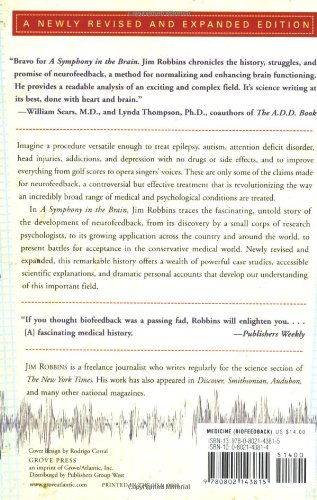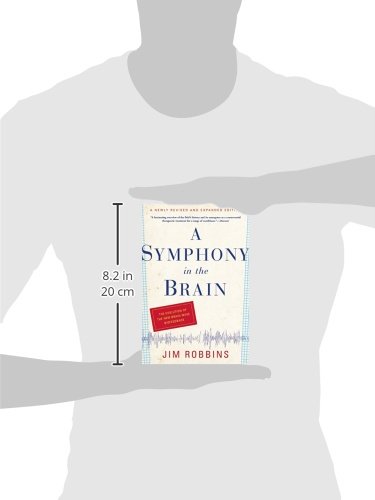Customer Services




A Symphony in the Brain: The Evolution of the New Brain Wave Biofeedback
J**O
Buena introducción
menos técnico que otros libros en el tema, eso es bueno para comenzar en el tema del neurofeedback
G**Y
Revolucionario
Una sinfonía en el cerebro nos lleva a través de la historia y el desarrollo del neurofeedback desde su creación hasta las últimas tecnologías disponibles. La última tendencia en el área del neurofeedback es aportar retroalimentación al cerebro para que éste pueda auto-regularse a si mismo. En este sentido, es lamentable que el autor no experimentó con la única modalidad que trabaja basándose en este concepto de sabiduría intrínseca del cerebro de auto-regularse basado en neuro-dinámica no linear como lo es el NeurOptimal. Lo único que hace es describirla brevemente a través de testimonios, a pesar de haber probado prácticamente el resto de las modalidades antes de escribir sobre ellas para dar una opinión e información basado en experiencia propia. De todas formas, es un libro excelente con información revolucionaria que hoy en día es conocimiento común en ciertos círculos.
L**I
A great journey into a powerful, until now-dismissed, therapeutic tool
Scritto in maniera chiara e intrigante. L'autore racconta le storie delle persone (non per forza terapeuti!) - e dei loro clienti - dietro all'evoluzione di una tecnica degna di attenzione clinica. Sicuramente interessante per un pubblico esperto.
J**L
All in the head?
A very interesting review of the history of neurofeedback therapy/brain training. Robbins sets out his stall from page 1, in favour of neurofeedback, but doesn't shy away from the debate around it, nor from passing dispassionate comment about some of the personalities involved . There isn't robust research evidence backing up the anecdotal observed positive effects, and over the years much alternative/New Age chatter has surrounded the field given the claims made for it by some of its practitioners. Nevertheless there is a large body of practitioners, some of whom have been using the techniques (brainwave reading and training) for decades. Robbins makes perfectly clear that neurofeedback threatens the established medical and pharmaceutical interests at theoretical, control and business levels, to which he attributes most of their hostility to it. Fans of neurofeedback do seem partial to conspiracy theories and the further shores of the reasonable, if Robbins' pen portraits are anything to go by, so the standoff will no doubt run and run. But as Robbins points out the medical establishment works with all sorts of practices that are not scientifically proven or even provable - reflexology, acupuncture, psychotherapy etc - but these do not threaten the money making end of the business. If only a portion of the supposed benefits of neurofeedback are borne out - better sleep, reduced anxiety, enhanced wellbeing, reduced symptoms of ADHD etc - it's worth a look. Robbins is a long established science journalist and has been looking into neurofeedback for nearly 20 years. So he knows how to write engaging copy for the lay person, and knows his stuff. A very good book for anyone who wishes to gain an understanding of this developing field of brain training.
R**I
Leicht lesbarer Überblick über die Geschichte des Neurofeedback
Für alle, die sich einen Überblick über die Geschichte und Entwicklung des Neurofeedback verschaffen wollen, ganz netter Einstieg. Da es nicht zu wissenschaftlich, sondern eher populärwissenschaftlich geschrieben ist, lässt es sich leichter lesen, als andere Abhandlungen auf Englisch. Wenn man gerade dabei ist, die Faszination von Neurofeedback zu entdecken, steckt es einen an...und rührt kräftig - manchmal auch etwas übertrieben und unkritisch - die Werbetrommel für eben jenes Verfahren. Wie gesagt - als Einstieg und Überblick recht nett; für fundierteres Fachwissen ist es aber nötig, noch weitere - wissenschafliche!!!- Bücher zu lesen.
Trustpilot
1 month ago
2 months ago